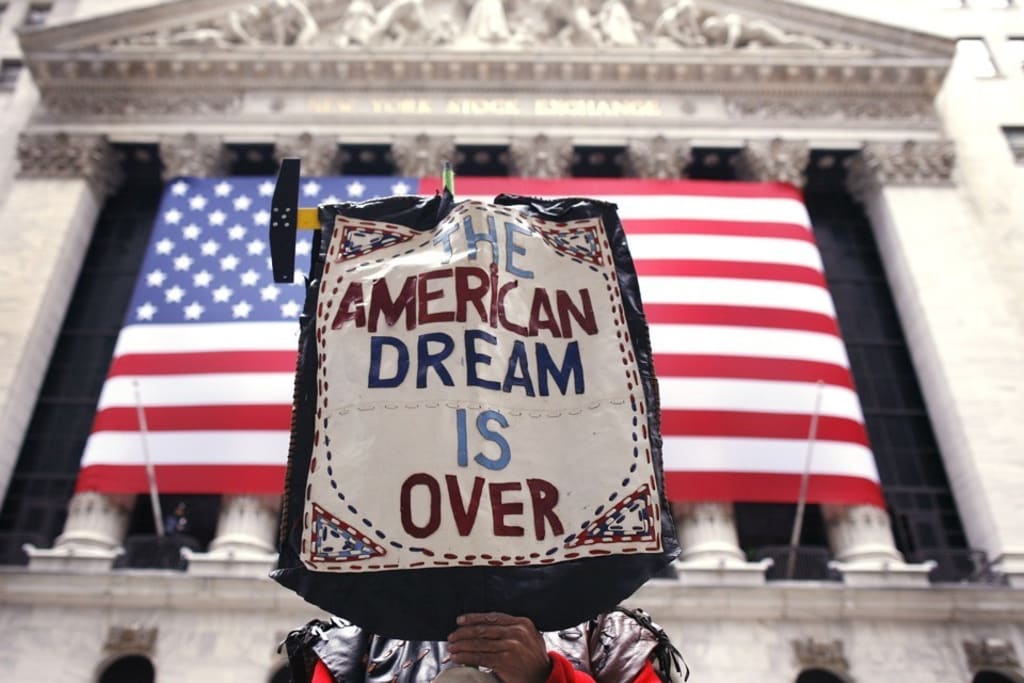The American Nightmare
Refuting the "Widespread" Availability of the American Dream

“It seems that many Americans covet the easy road to the Dream and in the process undercut the core values that established the Dream in the first place” (Warshauer). Due to the lack of respect for the morals on which the American Dream is founded, it is impossible to achieve. The notion of economic and social success is an illusion which has denied the reality of American life for the greater majority of Americans. Moreover, the United States’ economy is experiencing the worst crisis since the Great Depression, and it is directly correlated with the public opinion of the American Dream. A sense of entitlement is causing a decline in work effort while creating an inability to be satisfied with what one has already obtained. Americans are too slothful and unmotivated to apply themselves fully to succeeding. These factors contribute to the newfound impossibility of the American Dream.
The United States is experiencing the most troubling economic recession since the Great Depression, and this situation is directly related to the public opinion of the American Dream. In this country, the lower class “...lives on a lonely island of poverty in the midst of a vast ocean of material prosperity” (King). This quote is not an outrageous stretch. In fact, nearly 50 million people live below the poverty line in the 9th wealthiest country in the world (“Richest Countries in the World” 2016). It is this statistic that reveals the true shortcomings of the idea that the American Dream is feasible for everyone. Contrary to popular belief, the lower class is not the only group threatened by the economic crisis. In fact, in a September 2010 poll administered by Newsweek, “63% of Americans” answered that, "they did not think they would be able to maintain their current standard of living” (Zakaria). The lack of confidence in such matters can only result in what is exclusively comparable to a Faustian pact: applying for a loan out of fear that one may not be able to maintain one's lifestyle. American culture has normalized debt to the extent that it is considered impossible to be without it. “To fall in love and fall in debt" (Greenday) is the way of life in the modern United States. However, desperate for success, status, and accomplishment of the Dream, Americans are consciously ignoring these facts.
A sense of entitlement is causing a decrease in effort while enhancing the United States’ close relationship with greed. With consumerism’s progressive domination, “we can never be satisfied… We cannot be satisfied” (King). Want’s triumph over need and the endless demand for the newest gadgets discourages satisfaction with one’s current situation. In a society such as this, once one gains what is wanted, one is no longer dazzled by it. This sentiment is shared in F. Scott Fitzgerald’s The Great Gatsby, one of the most famous novels focusing on the American Dream. “It had seemed as close as a star to the moon. Now it was again a green light on the end of a dock. His count of enchanted object had diminished by one” (Fitzgerald 122). In this scene, Gatsby’s dream of reuniting with his long-gone lover is realized, but it is not meeting his expectations. For five years, Gatsby chased after Daisy’s love, but he is not content with the fruits of his labor. The inability to be satisfied coupled with the lack of enthusiasm for one’s current situation make the American Dream more elusive as time passes. As the days move, one must “run faster,” and “stretch out” one’s “arms farther” (Fitzgerald 149) to achieve what just yesterday was considered success. When one is all-consumed by chasing dreams, it can become impossible to keep up with the slippery idea.
Americans have become too unmotivated to apply themselves fully to succeeding. Due to this newfound laziness, “the can-do country is convinced that it can’t” (Zakaria). The nation as a whole is convinced that the people can rebound from the economic hardships, and individuals believe that there is nothing they can do on such a large scale. A result of this belief is a reliance on easy-money schemes and million-dollar game shows to get rich quickly. The citizens of the United States continue to depend on these tactics despite knowing that “achieving the American Dream through such means is a long shot at best. Too much chance exists. Too much luck is necessary” (Warshauer). People would rather waste a few dollars with hopes of easy riches than work hard with the promise of a steady salary. A notable example of this tendency is the high rate of lawsuits against large companies. “Failing to take responsibility for their own mistakes, plaintiffs look to the legal system to make misfortune into fortune” (Warshauer). This method of gain is a reflection of both the laziness and the sense of entitlement with which the American people are now faced. The slothful nature of the United States is crumbling the core values of the American Dream.
Conversely, some people such as Andrew O’Hehir claim that the American Dream is still feasible in modern society. Evidence of this viewpoint is supplied by people such as Mark Zuckerberg. Facebook, known as his “zillion-dollar invention” (O’Hehir), has taken over most social interaction and is “now believed to be worth many, many billions” (O’Hehir). Through truly hard work and determination, Zuckerberg achieved socioeconomic success and became an icon. However, his invention has contributed to the downfall of the American Dream for most other citizens. A lack of privacy and a surplus of wasted time are the most recognized issues with Facebook. Some people waste a large majority of their time on his website instead of working or bettering themselves. Facebook hinders the achievement of the American Dream, therefore the notion of economic and social success is an illusion which has denied the reality of American life for the greater majority of Americans.
The craving for economic and social success is an illusion which has prevented the realization of the reality of American life for the large majority of Americans. The United States is experiencing the most dramatic economic decline since the Great Depression, and this situation is directly correlated with the public opinion of the American Dream. A generic brand version of divine right is causing a decline in work ethic and a sharp increase in dissatisfaction with one’s life. Laziness and a lack of motivation have instituted a merger that led to a distinct lack in people willing to fully apply themselves to a task. These factors contribute to the newfound impossibility of the American Dream.
Works Cited
Fitzgerald, F Scott. The Great Gatsby. New York City, NY, Charles Scribner's Sons.
King, Martin Luther. “I Have a Dream.” 28 Aug. 1963, The March on Washington for Jobs and Freedom
“The Richest Countries In The World.” WorldAtlas, 9 Feb. 2017, www.worldatlas.com/articles/the-richest-countries-in-the-world.html.
Warshauer, Matthew. “The American Dream.” ARNet, 13 Feb. 2003,
www.americansc.org.uk/Online/American_Dream.htm.
Zakaria, Fareed. “How to Restore the American Dream.” Time, Time Inc., 21 Oct. 2010,
http://content.time.com/time/magazine/article/0,9171,2026916,00.html
About the Creator
Ollyvir Reagan
I'm nonbinary, they/them pronouns.
I'm sapphic.
I'm a Classics Major and an aspiring
Latin teacher.
I love Latin, history, math, art, and literature.






Comments
There are no comments for this story
Be the first to respond and start the conversation.